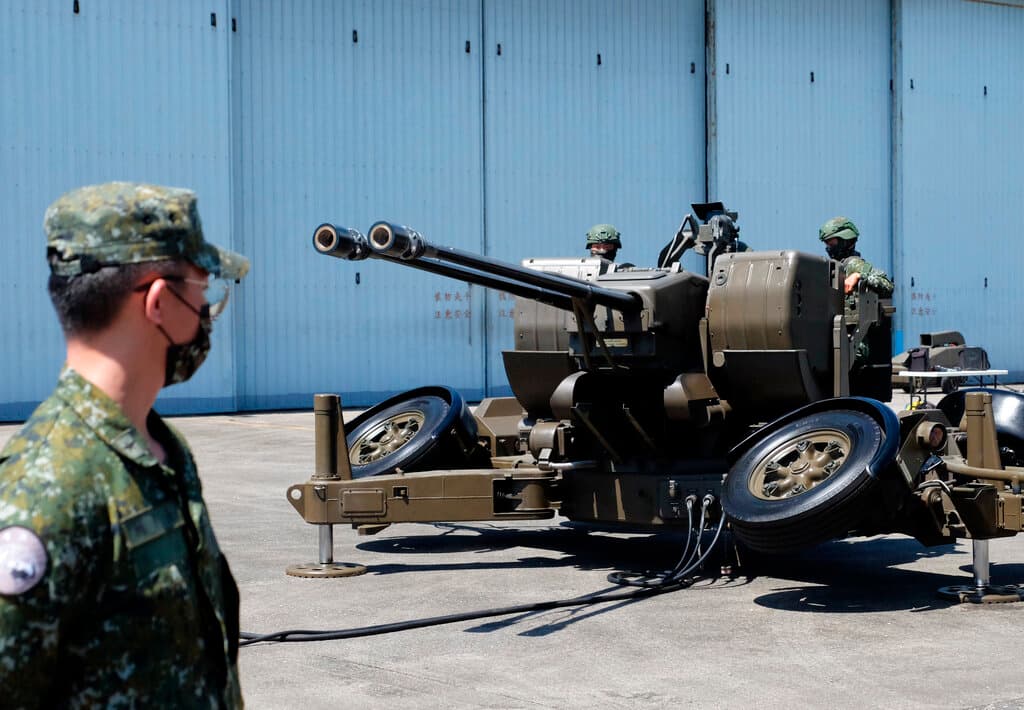Communist China Crackdown on Hong Kong Dissent Reverberates on Taiwan
The message is that China will look for any pretext to assert its will against those daring to defy its authoritarian rule.

The arrests, trials, and imprisonment of those who led the protests at Hong Kong against China’s dictatorial takeover send a frightening message to the 23.6 million citizens of the island state of Taiwan.
The message is that China will look for any pretext to assert its will against those daring to defy its authoritarian rule — as it’s done at Hong Kong, in violation of the agreement with Britain under which the former colony was to remain self-governing for 50 years after its formal takeover by China in 1997.
The English-language Global Times, an offshoot of the paper of the Chinese Communist Party, People’s Daily, labels as “deterrents to secessionists” the saga of arrests, guilty pleas, and sentences imposed on “dozens of anti-China figures.”
The crackdown on independent voices in Hong Kong, repressing heroic protests against edicts emanating from Beijing, comes as China conducts nonstop military exercises in the Taiwan Strait. “It would be much worse here than in Hong Kong,” a young Taiwanese told me. “They would arrest thousands of people. They would have concentration camps on the island.”
Like most Taiwanese, he seemed confident the island would remain free as long as its leaders and people stood firm against mainland demands and were sure of the commitment of the United States and other countries to guarantee defense. Inevitably, though, China’s rising pressure arouses concern if not fear.
China is expected to stoke concerns in the run-up to the congress of the ruling Chinese Communist Party at Beijing in November. No doubt President Xi will win a third five-year term, but he’s sure to keep up the pressure on Taiwan as he flexes his muscles as a strongman while distracting attention from economic pressures at home.
“We have to be wary,” Chieng Chung, of the Association of Strategic Foresight in Taipei, said. Tension will focus, he told Taiwan’s Central News Agency, on the median line that historically has divided the 100-mile-wide Taiwan Strait. Taiwan, he said, must “find ways to stop the Chinese military from crossing the line.”
That kind of basic defense appears impossible considering the impunity with which Chinese warships encircled Taiwan during visits led by Speaker Pelosi and then Senator Markey, both prominent Democrats accompanied by coteries of Democratic colleagues, on missions seen by the Chinese as having the blessing of President Biden.
True, the Chinese might ask, Mr. Biden made a show of trying to talk Mrs. Pelosi out of going, but didn’t she and her entourage, including five other members of Congress, travel on a luxury U.S. Air Force passenger plane with the words “United States of America” proudly emblazoned on the sides? Weren’t Secret Service agents on board just to make sure they got there and back safe and sound?
Chinese warships were conducting drills in the Taiwan Strait, playing their game of intimidation, when yet another American delegation, this one led by Indiana’s Republican governor, Eric Holcomb, with his commerce secretary in tow, showed up Sunday looking for “economic development” after Taiwan’s MediaTek said it’s opening shop in Indiana.
Like Mrs. Pelosi and Mr. Markey, Mr. Holcomb met Taiwan’s president, Tsai Ing-wen Tsai, who said Taiwan had confronted “military threats from China” and “democratic allies must stand together.” The Chinese have yet to make a fuss over Mr. Holcomb’s visit, but no one thinks China’s about to let up the pressure.
David Chen, with the American consulting firm CENTRA Technology, was reported by the Associated Press as saying “we are in for a risky period of testing boundaries and finding out who can achieve escalatory dominance across the diplomatic, military and economic domains.”
So far the Chinese game is not having the impact the Chinese might be looking for. “Taiwan braces for sustained Chinese pressure,” said a headline from Taiwan’s Central News Agency, reporting that “the public mood in Taiwan is mixed.”
The agency cited polls showing 60 percent to 78 percent of respondents “were not worried about large-scale live-fire military drills launched by Beijing” after Mrs. Pelosi’s visit. Taiwan’s defense ministry said China’s “simulated attack” had been “met with a shrug by many in a country wearily attuned to Chinese saber-rattling.”
One sticking point is that China and Taiwan, on an official level, have not been talking to one another for six years. That’s when Ms. Tsai was elected president for the first time as the candidate of the Democratic Progressive Party. The DPP has called for “independence” for Taiwan as a nation; Ms. Tsai prefers that Taiwan remain in a gray area in which it’s totally self-ruled but not declaring nationhood.
In fact, China and Taiwan need each other. Despite showing off its military superiority, China remains by far Taiwan’s largest trading partner. Taiwan this year is exporting more than $200 billion worth of products, notably semiconductors and other electronic items, to China, including Hong Kong, for a trade surplus of more than $100 billion.
America ranks far behind China in two-way trade with Taiwan, at more than $110 billion expected this year. Washington, worried about its trade deficit of more than $30 billion with Taiwan, is planning trade talks with Taiwan in the fall.
Kurt Campbell, coordinating White House policy in the Indo-Pacific, said the talks would “deepen our ties with Taiwan,” to which an official with China’s commerce ministry said China “firmly opposes” another step toward Taiwan independence.

